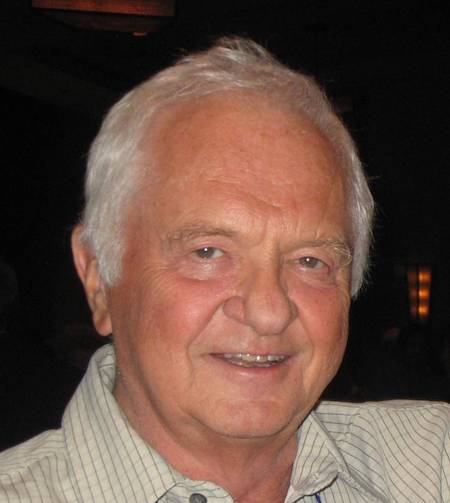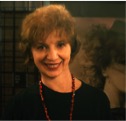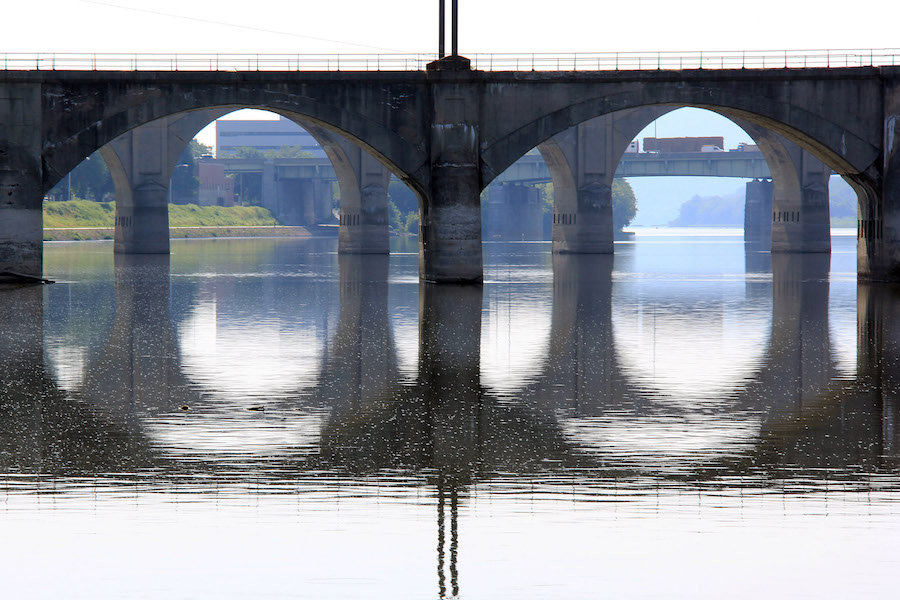Past events
First Collegium of Eminent Scientists' Lecture
Saturday, November 19, 2016, at 3:00pm
The Kosciuszko Foundation has the pleasure to present the first Collegium of Eminent Scientists Lecture: Protochemistries are a Bridge by Prof. Roald Hoffmann winner of the Nobel Prize in Chemistry (1981), Frank H. T. Rhodes Professor of Humane Letters, Emeritus
Saturday, November 19th, 2016, 3:00 p.m. at the Kosciuszko Foundation House: 15 E 65th Street, New York, NY 10065
The event is free and open to the public. Space is limited. Registration required. RSVP
|
PROGRAM
The event will also feature On the Road - American Landscape - the photo exhibition by Dr. Hanna Kelker. |
The Collegium of Eminent Scientists
In order to bring deserved recognition to the achievements of Polish scientists, the Kosciuszko Foundation (KF) has established the "Kosciuszko Foundation Collegium of Eminent Scientists."
The goals of this initiative are: (i) to honor eminent scientists of Polish origin and ancestry who have achieved recognition in the USA; (ii) to recognize, highlight, and publicize their achievements and important contributions in the respective fields of science; (iii) to identify, record, and catalogue eminent Polish scientists and scientists of Polish descent residing in America.
The Collegium is inaugurating a lecture series that will introduce distinguished collegium members and publicize their achievements.
Members of the KF Collegium of Eminent Scientists
Prof. Roald Hoffmann
 Prof. Roald Hoffmann was born in 1937 in Zloczow, Poland. Having survived the war, he came to the U. S. in 1949, and studied chemistry at Columbia and Harvard Universities (Ph.D. 1962). Since 1965 he is at Cornell University, now as the Frank H. T. Rhodes Professor of Humane Letters Emeritus. He has received many of the honors of his profession, including the 1981 Nobel Prize in Chemistry (shared with Kenichi Fukui).
Prof. Roald Hoffmann was born in 1937 in Zloczow, Poland. Having survived the war, he came to the U. S. in 1949, and studied chemistry at Columbia and Harvard Universities (Ph.D. 1962). Since 1965 he is at Cornell University, now as the Frank H. T. Rhodes Professor of Humane Letters Emeritus. He has received many of the honors of his profession, including the 1981 Nobel Prize in Chemistry (shared with Kenichi Fukui).
"Protochemistries are a Bridge" is the way Roald Hoffmann likes to characterize the particular blend of computations stimulated by experiment and the construction of generalized models, of frameworks for understanding, that is his contribution to chemistry. The pedagogical perspective is very strong in his work.
"People did chemistry, darn good chemistry too, before there were ever chemists. For transformations of matter are inherent in the human condition. In winning metals from their ores, using them in weapons and decorative objects, in preparing and preserving food, in cosmetics, medicines, ceramics, in tanning leather, in dyes, in cleansing and mummification, craftsmen and women in every culture came up with some superb experimental chemistry. These stories of protochemistry, some of which I will relate, to this day form a natural bridge between chemists and nonchemists , between chemistry and culture. They stress the essential importance of experiment, and… of the underlying economics that governs much human activity. Much more than local color, these stories tender homage to the past, to the ingenuity of human beings. Protochemistries also connect our world, in time and in substance; their stories normalize science. And they plant science firmly in the context of world culture – chemistry in culture, culture in chemistry." Roald Hoffmann
Notable at the same time is his reaching out to the general public; he participated, for example, in the production of a television course in introductory chemistry titled "The World of Chemistry," shown widely since 1990. And, as a writer, Hoffmann has carved out a land between science, poetry, and philosophy, through many essays and three books, "Chemistry Imagined" with artist Vivian Torrence, "The Same and Not the Same and Old Wine" (translated into six languages), "New Flasks: Reflections on Science and Jewish Tradition," with Shira Leibowitz Schmidt.
Hoffmann is also an accomplished poet and playwright. He began writing poetry in the mid-1970s, eventually publishing the first of a number of collections, "The Metamict State," in 1987, followed three years later by "Gaps and Verges," then "Memory Effects" (1999), "Soliton" (2002). A bilingual selection of his poems has appeared in Spanish. He has also co-written a play with fellow chemist Carl Djerassi, entitled "Oxygen," which has been performed worldwide, translated into ten languages. A second play by Roald Hoffmann, "Should've," has had several workshop productions since 2006; a new play, "We Have Something That Belongs to You," had its first workshop production in 2009.
Unadvertised, a monthly cabaret Roald runs at the Cornelia Street Café in Greenwich Vilage, "Entertaining Science," has become the hot cheap ticket in NYC.
Professor Zbigniew Darzynkiewicz
 Dr. Darzynkiewicz received his M.D. (with the highest honors) and his Ph.D. from the Medical University of Warsaw in Poland and completed his post-graduate studies at the State University of New York at Buffalo and at the Medical Nobel Institute of Karolinska Institute, Stockholm, Sweden. Subsequently he was the Member of the Memorial Sloan-Kettering Institute for Cancer Research, New York, N.Y. and the Professor of Cell Biology and Genetics at Cornell University Medical School. Since 1990 he is the Director of the Brander Cancer Research Institute at the New York Medical College and holds Professorship in the Departments of Pathology, Medicine and Microbiology/Immunology at the same College.
Dr. Darzynkiewicz received his M.D. (with the highest honors) and his Ph.D. from the Medical University of Warsaw in Poland and completed his post-graduate studies at the State University of New York at Buffalo and at the Medical Nobel Institute of Karolinska Institute, Stockholm, Sweden. Subsequently he was the Member of the Memorial Sloan-Kettering Institute for Cancer Research, New York, N.Y. and the Professor of Cell Biology and Genetics at Cornell University Medical School. Since 1990 he is the Director of the Brander Cancer Research Institute at the New York Medical College and holds Professorship in the Departments of Pathology, Medicine and Microbiology/Immunology at the same College.
Dr. Darzynkiewicz's research concentrates on molecular mechanisms associated with cell proliferation, apoptosis, and sensitivity to anti-cancer drugs. He developed several analytical methodologies that have world-wide application and was the President of the Cell Kinetics Society (1986-87) and of the International Society for Analytical Cytology (1993-1994). He is the Member (Foreign) of the Polish Academy of Sciences (PAN; Warsaw), Polish Academy of Learning (PAU, Krakow) and the Fellow of the American Institute for Medical and Biological Engineering (AIMBE). Dr. Darzynkiewicz received a Doctor Honoris Causa degree from his alma mater, the Warsaw Medical University, and the prestigious Casimir Funk Natural Sciences Award from the Polish Institute of Arts and Sciences in America (PIASA). He has published over 740 articles in peer-reviewed journals, has edited and co-authored 15 books and holds eight US patents. His publications have been cited in the scientific literature over 40,500 times and he presented by invitation over 350 lectures and seminars on national and international congresses, symposia, and in various research institutions.
Magdalena Baczewska's Bio
 Born in Poland, Magdalena Baczewska [baCHEVska] has enjoyed a multi-faceted career as a pianist, harpsichordist, educator, recording artist, producer, and an administrator, currently serving as Director of the Music Performance Program and Lecturer in Music at Columbia University. She has performed with the San Francisco Symphony, China National Symphony, and Macao Symphony, among others. She has appeared in concert with maestro Tan Dun, as well as violinist Joshua Bell, and performed throughout Europe, China, and the US, appearing in Carnegie Hall (NYC), Davies Symphony Hall (San Francisco), National Center for Performing Arts (Beijing), Guangzhou Opera House (Guangzhou), and Salle Cortot (Paris), among others.
Born in Poland, Magdalena Baczewska [baCHEVska] has enjoyed a multi-faceted career as a pianist, harpsichordist, educator, recording artist, producer, and an administrator, currently serving as Director of the Music Performance Program and Lecturer in Music at Columbia University. She has performed with the San Francisco Symphony, China National Symphony, and Macao Symphony, among others. She has appeared in concert with maestro Tan Dun, as well as violinist Joshua Bell, and performed throughout Europe, China, and the US, appearing in Carnegie Hall (NYC), Davies Symphony Hall (San Francisco), National Center for Performing Arts (Beijing), Guangzhou Opera House (Guangzhou), and Salle Cortot (Paris), among others.
An avid educator, Baczewska has given piano master classes in the Central Conservatory (Beijing, China), Grassland International Music Festival (Hohhot, Inner Mongolia); International Keyboard Institute and Festival (NYC); New York Piano Festival (NYC). She is professor at Accademia Europea Villa Bossi in Varese, Italy.
Baczewska is a laureate of international piano competitions: the Chopin Competition at the Kosciuszko Foundation, Dorothy McKenzie Recognition Award, Prix du piano Ecoles d'Art Américaines Fontainebleau, Grand prix European American Music Alliance Paris, as well as the Outstanding Achievement Award from the Polish Minister of Culture. Baczewska holds Bachelor and Master's degrees from Mannes College The New School for Music, and her doctoral degree from Manhattan School of Music. Magdalena is a Yamaha Artist.
Professor Hanna Kelker's Bio
 Hanna Kelker was born in Skierniewice, Poland. After completing her undergraduate studies in biology at the University of Warsaw, she pursued her scientific interests in the United States where she received her Ph.D. degree. Most of her career was spent in scientific research at New York University School of Medicine where she studied the immunological properties of the AIDS virus. As a New York City resident she actively participates in the life of the Polish community where she serves on the Board of Directors of the Polish Institute of Arts and Sciences in America and the Board of Trustees of the Kosciuszko Foundation.
Hanna Kelker was born in Skierniewice, Poland. After completing her undergraduate studies in biology at the University of Warsaw, she pursued her scientific interests in the United States where she received her Ph.D. degree. Most of her career was spent in scientific research at New York University School of Medicine where she studied the immunological properties of the AIDS virus. As a New York City resident she actively participates in the life of the Polish community where she serves on the Board of Directors of the Polish Institute of Arts and Sciences in America and the Board of Trustees of the Kosciuszko Foundation.
Her serious pursuit of photography arises from her lifelong interest in the arts and her fascination with how images are portrayed. She is intrigued by images created by light, and she tries to capture the patterns that light can create when shining on or reflected from various objects.
Dr. Kelker has studied photography at New York University, and she is an active member of the Polish American Photographic Club. Her work has appeared at numerous group shows including the SoHo Photo Gallery and at the Salons of the Polish American Photographic Club. She has presented solo exhibitions at the Kurier Plus Gallery, the gallery of the Polish Institute of Arts and Sciences in America, the Polish Art Gallery at Starbucks in Greenpoint, in New York City and in Galeria Lamelli in Krakow, Poland.

The Exhibition On the Road - American Landscape displays a collection of Dr. Kelker's photographs of the American landscape and of images painted by light that were taken during travels around the country. More

